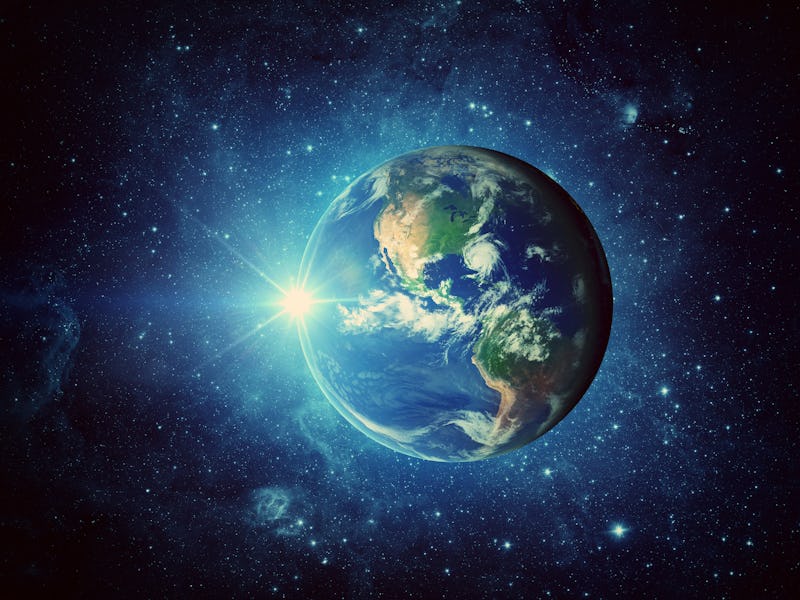5 stunning nature documentaries to stream at home for Earth Day
Learn about lemurs, nocturnal predators, climate crisis solutions, and more.

On the 50th anniversary of Earth Day, the planet looks different than ever before, for better or worse. A global pandemic means we're facing an enormous public health threat — but worldwide quarantine also means a drop in carbon dioxide, reduced air pollution, and animals returning to human spaces. (Cue the "We are the virus" memes.)
This Earth Day is definitely a weird one, but a favorite indoor hobby of nature enthusiasts remains: watching nature documentaries.
Here are five that will spark wonder, evoke fear, and maybe inspire you to think a little differently about the natural world.
5. Climate Change — The Facts
David Attenborough's scary new climate change documentary offers some hope.
David Attenborough’s name is practically synonymous with nature documentaries. Think Planet Earth, Blue Planet, and Africa. At times, his films touch on conservation and climate change, and they always emphasize the beauty and wonder of the natural world.
This one is different. With Climate Change — The Facts, Attenborough goes right for the climate change jugular. That means talking about how burning fossil fuels and raising livestock contribute to rising, planet-warming greenhouse gases, how a global temperature increase of one degree Celsius is a bigger deal than you think, and why sea level rise could change everything.
The movie explores these themes around the world: Louisiana losing land at an alarming rate (about a football field every 45 minutes), tropical corals bleaching and dying, and why rainforest trees are the “lungs of the planet.” In the mix are interviews with experts and activists, including Greta Thunberg and former NASA scientist James Hansen, who famously warned Congress about climate change back in 1988.
While this isn’t your typical feel-good nature documentary, it is hopeful. Throughout the documentary, experts repeatedly remind viewers that not all is lost: There is time to take urgent, drastic measures to curb the effects of climate change — but not much time.
“What happens next is up to us all,” as Attenborough puts it. “I truly believe that, together, we can bring about the transformative change that is needed.”
Where to watch: The documentary premieres on PBS on April 22, Earth Day, at 8 p.m. Eastern time.
4. Night on Earth
What's more frightening than a scorpion? Scorpions at night.
If what you're looking for is less bleak look at the future and more wow animals are sick, the documentary series Night on Earth is the right choice. The six-part series takes a look at natural nightlife around the world, offering a unique perspective on how wildlife behaves when the sun goes down.
The series covers city-dwelling monkeys, curious deep-sea marine life, and nocturnal predators on plains of Africa. More than most, this documentary might make you wonder how in the heck the filmmakers were able to get such great footage — especially considering humans aren't equipped with the night vision used by big cats on the prowl.
Where to watch: Netflix
3. Wild Alaska
Alaska is way more wild than you'd expect — in every sense of the word.
Polar bears and Arctic foxes seem rather vicious — so it stands to reason that Alaska is, broadly speaking, a pretty wild place. But the intriguing wildlife of the frozen state goes way deeper, from the ferocious to the adorable (hello, collared pika.)
The three-part series takes a look at Alaska during the spring, summer, and winter. The picturesque scenery of the sprawling frozen land is almost as show-stopping as the beautiful animals that inhabit it.
As a bonus: For the live version, you can also check out brown bears fishing in the streams of Katmai National Park in Alaska, thanks to a live-stream of the park running 24/7.
Where to watch: Amazon Prime
2. Jane
We owe a lot of the information we have about chimpanzees, our closest primate relatives, to Jane Goodall’s research, conducted while she lived among chimps at a reserve in Tanzania. But it might surprise you to know that Jane took on those missions with no scientific training. She took the position at age 26, trained to be a scientist while on the job, started a family, and braved a few scary moments with some aggressive monkeys.
Thanks to tons of original footage, viewers get to really peer into Goodall’s life, and take a close look at what it’s like to pick up and move far away from the life you know — and to do some revolutionary science while you’re at it.
1. Island of Lemurs: Madagascar
Welcome to the land of the lemurs.
Adorable, energetic primates, a mysterious island, narration by Morgan Freeman — what’s not to like? The strange lives of lemurs are one of the Earth's great wonders, and if you liked the animated movie Madagascar, it's pretty awesome to get a close look at the real thing.
Freeman refers to Madagascar, and the lemurs that live there, as “a real place you could never imagine, and strange creatures you could never forget.”
Where to watch: Amazon Prime